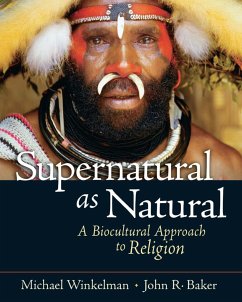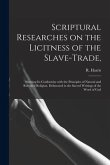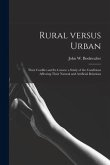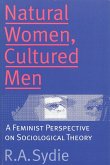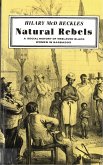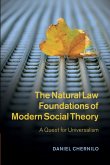- Broschiertes Buch
- Merkliste
- Auf die Merkliste
- Bewerten Bewerten
- Teilen
- Produkt teilen
- Produkterinnerung
- Produkterinnerung
"Supernatural as Natural "examines ways in which our religious beliefs and experiences are products of our biological make-up. This book takes as its fundamental starting point the insight that humans are animals whose primary means of adapting to the world is culture, including religion.
Andere Kunden interessierten sich auch für
![Supernatural and Natural Selection Supernatural and Natural Selection]() Lyle B. SteadmanSupernatural and Natural Selection88,99 €
Lyle B. SteadmanSupernatural and Natural Selection88,99 €![The Natural Family Where it Belongs The Natural Family Where it Belongs]() Allan C. CarlsonThe Natural Family Where it Belongs68,99 €
Allan C. CarlsonThe Natural Family Where it Belongs68,99 €![Scriptural Researches on the Licitness of the Slave-trade,: Shewing Its Conformity With the Principles of Natural and Revealed Religion, Delineated in Scriptural Researches on the Licitness of the Slave-trade,: Shewing Its Conformity With the Principles of Natural and Revealed Religion, Delineated in]() Scriptural Researches on the Licitness of the Slave-trade,: Shewing Its Conformity With the Principles of Natural and Revealed Religion, Delineated in18,99 €
Scriptural Researches on the Licitness of the Slave-trade,: Shewing Its Conformity With the Principles of Natural and Revealed Religion, Delineated in18,99 €![Rural Versus Urban: Their Conflict and Its Causes; a Study of the Conditions Affecting Their Natural and Artificial Relations Rural Versus Urban: Their Conflict and Its Causes; a Study of the Conditions Affecting Their Natural and Artificial Relations]() Rural Versus Urban: Their Conflict and Its Causes; a Study of the Conditions Affecting Their Natural and Artificial Relations26,99 €
Rural Versus Urban: Their Conflict and Its Causes; a Study of the Conditions Affecting Their Natural and Artificial Relations26,99 €![Natural Women, Cultured Men Natural Women, Cultured Men]() R A SydieNatural Women, Cultured Men42,99 €
R A SydieNatural Women, Cultured Men42,99 €![Natural Rebels Natural Rebels]() Hilary BecklesNatural Rebels48,99 €
Hilary BecklesNatural Rebels48,99 €![The Natural Law Foundations of Modern Social Theory The Natural Law Foundations of Modern Social Theory]() Daniel CherniloThe Natural Law Foundations of Modern Social Theory52,99 €
Daniel CherniloThe Natural Law Foundations of Modern Social Theory52,99 €-
-
-
"Supernatural as Natural "examines ways in which our religious beliefs and experiences are products of our biological make-up. This book takes as its fundamental starting point the insight that humans are animals whose primary means of adapting to the world is culture, including religion.
Hinweis: Dieser Artikel kann nur an eine deutsche Lieferadresse ausgeliefert werden.
Hinweis: Dieser Artikel kann nur an eine deutsche Lieferadresse ausgeliefert werden.
Produktdetails
- Produktdetails
- Verlag: Taylor & Francis
- Seitenzahl: 384
- Erscheinungstermin: 1. Oktober 2007
- Englisch
- Abmessung: 249mm x 203mm x 15mm
- Gewicht: 680g
- ISBN-13: 9780131893030
- ISBN-10: 0131893033
- Artikelnr.: 24806648
- Herstellerkennzeichnung
- Libri GmbH
- Europaallee 1
- 36244 Bad Hersfeld
- gpsr@libri.de
- Verlag: Taylor & Francis
- Seitenzahl: 384
- Erscheinungstermin: 1. Oktober 2007
- Englisch
- Abmessung: 249mm x 203mm x 15mm
- Gewicht: 680g
- ISBN-13: 9780131893030
- ISBN-10: 0131893033
- Artikelnr.: 24806648
- Herstellerkennzeichnung
- Libri GmbH
- Europaallee 1
- 36244 Bad Hersfeld
- gpsr@libri.de
Michael Winkelman, Ph.D. (University of California-Irvine), M.P.H. (University of Arizona) is an Associate Professor in the School of Human Evolution and Social Change at Arizona State University. He served as President of the Anthropology of Consciousness section of the American Anthropological Association, as was the founding President of its Anthropology of Religion Section. His principal publications on shamanism include Shamans, Priests and Witches (1992) and Shamanism (2000). He has also addressed the role of psychedelic medicines in shamanism in his co-edited Psychedelic Medicine. John Baker, Dr. Phil. (Universität Hamburg, Germany) is a Professor of Anthropology at Moorpark College. He has authored several papers on the constructive use of altered states of consciousness and on the history and ritual uses of psychoactive substances. He is presently serving as the President of the Society for the Anthropology of Consciousness.
Introduction
Religion's Family Resemblances
Religion, Spirituality, and Religiosity
Overview of Book
Chapter 1: Anthropology and the Study of Religion
Introduction to the Anthropological Study of Religion
Western Perspectives on Religion
The Development of Anthropological Approaches to Religion
The Four-Field Approach of Anthropology
Conclusion: The Biocultural Approach to the Study of Religiosity
Chapter 2: Our World and How We Know It
Introduction
Science, Religion, and the Universe
Mysticism as Science
Conclusions: Comparing Science and Religion
Chapter 3: Consciousness and Spiritual Experiences
Opening vignette: Visionary Spiritual Experiences and the Origins of Major
Religious Traditions
Introduction
What is Consciousness?
The Biological Bases of Spiritual Consciousness: The Integrative Mode of
Consciousness
Origins of Religious Experiences: Natural Induction of the Integrative Mode
of Consciousness
Adaptive Aspects of the Integrative Mode of Consciousness
Conclusion: Religious Experience as Personal Experience of Biology
Appendix: Assessing Mystical Experiences/Hood's Mysticism Scale
Chapter 4: Animal Rituals and the Roots of Religiosity
Introduction: Ritual in the Animal World
What are Rituals?
The Triune Brain and Ritual Behavior
Animal Rituals
The Evolution of Ritual Behaviors
Conclusions: The Animal Roots of Human Ritual Activity
Chapter 5: The Origins of Shamanism and the Flowering of Religiosity
Introduction: Evidence for the Emergence of New Forms of Ritual
What are Shamans?
The Evolutionary Origins of Spiritual Experiences
Psilocybin-Containing Mushrooms as Sources of Spiritual Experiences
The Middle/Upper Paleolithic Transition and Human Cultural Evolution
Human Cognitive Evolution: The Emergence of Specialized Intelligences
"Complex Hunter-Gatherer Type Religions": The Rise of Ancestor Cults and
Priests
Conclusions
Chapter 6: Origins and Functions of Religious Healing
Introduction: Religious Healing as a Cultural Universal
The Co-Evolution of Healing and Religiosity
Shamanism as a Foundation for Religious Healing Adaptations
Religious Adaptations in Healing Processes
Conclusions: Shamanic Healing and the Holistic Imperative
Chapter 7: Religion and Cognition: How Religion Shapes How We Think
Introduction: Religious Ideas and the Structure of the Universe
Animism: The Belief in Spirit Beings
Myth and the Universe
Substantive Beliefs
Conclusions: Spirit Concepts as Indigenous Psychologies
Chapter 8: Religion and Emotions
Introduction
Bronislav Malinowski: The Emotional Adaptiveness of Magic and Religion
Sigmund Freud and the Roles of the Unconscious in Religion
Religion, Sex, and Gender
How Religion Shapes Our Development
Religion as an Evolutionary Byproduct? Attachment Theory and Religion
Religious Conversion as Learning a Second Culture
Conclusions
Chapter 9: Religion and Society: How Religion Shapes Our Relations with
Others
Introduction
The Evolutionary Origins of Human Social Organization and Religion
Durkheim and the Social Symbolic Approaches to Religion
Religion and Social Control
The Social Origins of Conceptualizations of Deity and the Sacred
Religion as a Biologically-Based Adaptive Social Mechanism
Conclusions: Durkheim's Legacy in Understanding Religion as a Social and
Symbolic Phenomenon
Chapter 10: Supernatural Evil
Introduction: Supernatural Evil as a Religious Universal
Anthropological Views of Sorcery and Witchcraft
The Sorcerer/Witch as a Social Universal of Religion
and Shamanism
Witchcraft and Heresy in Europe
Human Sacrifice
Conclusions
Chapter 11: Conclusions: Religion in Evolutionary Perspective
Introduction
The Conceptual Frameworks of Evolution
Assessing the Evolutionary Status of Religious Features
Why Must we Learn to Disagree?
Conclusions: Universalist Perspectives
References
Index
Religion's Family Resemblances
Religion, Spirituality, and Religiosity
Overview of Book
Chapter 1: Anthropology and the Study of Religion
Introduction to the Anthropological Study of Religion
Western Perspectives on Religion
The Development of Anthropological Approaches to Religion
The Four-Field Approach of Anthropology
Conclusion: The Biocultural Approach to the Study of Religiosity
Chapter 2: Our World and How We Know It
Introduction
Science, Religion, and the Universe
Mysticism as Science
Conclusions: Comparing Science and Religion
Chapter 3: Consciousness and Spiritual Experiences
Opening vignette: Visionary Spiritual Experiences and the Origins of Major
Religious Traditions
Introduction
What is Consciousness?
The Biological Bases of Spiritual Consciousness: The Integrative Mode of
Consciousness
Origins of Religious Experiences: Natural Induction of the Integrative Mode
of Consciousness
Adaptive Aspects of the Integrative Mode of Consciousness
Conclusion: Religious Experience as Personal Experience of Biology
Appendix: Assessing Mystical Experiences/Hood's Mysticism Scale
Chapter 4: Animal Rituals and the Roots of Religiosity
Introduction: Ritual in the Animal World
What are Rituals?
The Triune Brain and Ritual Behavior
Animal Rituals
The Evolution of Ritual Behaviors
Conclusions: The Animal Roots of Human Ritual Activity
Chapter 5: The Origins of Shamanism and the Flowering of Religiosity
Introduction: Evidence for the Emergence of New Forms of Ritual
What are Shamans?
The Evolutionary Origins of Spiritual Experiences
Psilocybin-Containing Mushrooms as Sources of Spiritual Experiences
The Middle/Upper Paleolithic Transition and Human Cultural Evolution
Human Cognitive Evolution: The Emergence of Specialized Intelligences
"Complex Hunter-Gatherer Type Religions": The Rise of Ancestor Cults and
Priests
Conclusions
Chapter 6: Origins and Functions of Religious Healing
Introduction: Religious Healing as a Cultural Universal
The Co-Evolution of Healing and Religiosity
Shamanism as a Foundation for Religious Healing Adaptations
Religious Adaptations in Healing Processes
Conclusions: Shamanic Healing and the Holistic Imperative
Chapter 7: Religion and Cognition: How Religion Shapes How We Think
Introduction: Religious Ideas and the Structure of the Universe
Animism: The Belief in Spirit Beings
Myth and the Universe
Substantive Beliefs
Conclusions: Spirit Concepts as Indigenous Psychologies
Chapter 8: Religion and Emotions
Introduction
Bronislav Malinowski: The Emotional Adaptiveness of Magic and Religion
Sigmund Freud and the Roles of the Unconscious in Religion
Religion, Sex, and Gender
How Religion Shapes Our Development
Religion as an Evolutionary Byproduct? Attachment Theory and Religion
Religious Conversion as Learning a Second Culture
Conclusions
Chapter 9: Religion and Society: How Religion Shapes Our Relations with
Others
Introduction
The Evolutionary Origins of Human Social Organization and Religion
Durkheim and the Social Symbolic Approaches to Religion
Religion and Social Control
The Social Origins of Conceptualizations of Deity and the Sacred
Religion as a Biologically-Based Adaptive Social Mechanism
Conclusions: Durkheim's Legacy in Understanding Religion as a Social and
Symbolic Phenomenon
Chapter 10: Supernatural Evil
Introduction: Supernatural Evil as a Religious Universal
Anthropological Views of Sorcery and Witchcraft
The Sorcerer/Witch as a Social Universal of Religion
and Shamanism
Witchcraft and Heresy in Europe
Human Sacrifice
Conclusions
Chapter 11: Conclusions: Religion in Evolutionary Perspective
Introduction
The Conceptual Frameworks of Evolution
Assessing the Evolutionary Status of Religious Features
Why Must we Learn to Disagree?
Conclusions: Universalist Perspectives
References
Index
Introduction
Religion's Family Resemblances
Religion, Spirituality, and Religiosity
Overview of Book
Chapter 1: Anthropology and the Study of Religion
Introduction to the Anthropological Study of Religion
Western Perspectives on Religion
The Development of Anthropological Approaches to Religion
The Four-Field Approach of Anthropology
Conclusion: The Biocultural Approach to the Study of Religiosity
Chapter 2: Our World and How We Know It
Introduction
Science, Religion, and the Universe
Mysticism as Science
Conclusions: Comparing Science and Religion
Chapter 3: Consciousness and Spiritual Experiences
Opening vignette: Visionary Spiritual Experiences and the Origins of Major
Religious Traditions
Introduction
What is Consciousness?
The Biological Bases of Spiritual Consciousness: The Integrative Mode of
Consciousness
Origins of Religious Experiences: Natural Induction of the Integrative Mode
of Consciousness
Adaptive Aspects of the Integrative Mode of Consciousness
Conclusion: Religious Experience as Personal Experience of Biology
Appendix: Assessing Mystical Experiences/Hood's Mysticism Scale
Chapter 4: Animal Rituals and the Roots of Religiosity
Introduction: Ritual in the Animal World
What are Rituals?
The Triune Brain and Ritual Behavior
Animal Rituals
The Evolution of Ritual Behaviors
Conclusions: The Animal Roots of Human Ritual Activity
Chapter 5: The Origins of Shamanism and the Flowering of Religiosity
Introduction: Evidence for the Emergence of New Forms of Ritual
What are Shamans?
The Evolutionary Origins of Spiritual Experiences
Psilocybin-Containing Mushrooms as Sources of Spiritual Experiences
The Middle/Upper Paleolithic Transition and Human Cultural Evolution
Human Cognitive Evolution: The Emergence of Specialized Intelligences
"Complex Hunter-Gatherer Type Religions": The Rise of Ancestor Cults and
Priests
Conclusions
Chapter 6: Origins and Functions of Religious Healing
Introduction: Religious Healing as a Cultural Universal
The Co-Evolution of Healing and Religiosity
Shamanism as a Foundation for Religious Healing Adaptations
Religious Adaptations in Healing Processes
Conclusions: Shamanic Healing and the Holistic Imperative
Chapter 7: Religion and Cognition: How Religion Shapes How We Think
Introduction: Religious Ideas and the Structure of the Universe
Animism: The Belief in Spirit Beings
Myth and the Universe
Substantive Beliefs
Conclusions: Spirit Concepts as Indigenous Psychologies
Chapter 8: Religion and Emotions
Introduction
Bronislav Malinowski: The Emotional Adaptiveness of Magic and Religion
Sigmund Freud and the Roles of the Unconscious in Religion
Religion, Sex, and Gender
How Religion Shapes Our Development
Religion as an Evolutionary Byproduct? Attachment Theory and Religion
Religious Conversion as Learning a Second Culture
Conclusions
Chapter 9: Religion and Society: How Religion Shapes Our Relations with
Others
Introduction
The Evolutionary Origins of Human Social Organization and Religion
Durkheim and the Social Symbolic Approaches to Religion
Religion and Social Control
The Social Origins of Conceptualizations of Deity and the Sacred
Religion as a Biologically-Based Adaptive Social Mechanism
Conclusions: Durkheim's Legacy in Understanding Religion as a Social and
Symbolic Phenomenon
Chapter 10: Supernatural Evil
Introduction: Supernatural Evil as a Religious Universal
Anthropological Views of Sorcery and Witchcraft
The Sorcerer/Witch as a Social Universal of Religion
and Shamanism
Witchcraft and Heresy in Europe
Human Sacrifice
Conclusions
Chapter 11: Conclusions: Religion in Evolutionary Perspective
Introduction
The Conceptual Frameworks of Evolution
Assessing the Evolutionary Status of Religious Features
Why Must we Learn to Disagree?
Conclusions: Universalist Perspectives
References
Index
Religion's Family Resemblances
Religion, Spirituality, and Religiosity
Overview of Book
Chapter 1: Anthropology and the Study of Religion
Introduction to the Anthropological Study of Religion
Western Perspectives on Religion
The Development of Anthropological Approaches to Religion
The Four-Field Approach of Anthropology
Conclusion: The Biocultural Approach to the Study of Religiosity
Chapter 2: Our World and How We Know It
Introduction
Science, Religion, and the Universe
Mysticism as Science
Conclusions: Comparing Science and Religion
Chapter 3: Consciousness and Spiritual Experiences
Opening vignette: Visionary Spiritual Experiences and the Origins of Major
Religious Traditions
Introduction
What is Consciousness?
The Biological Bases of Spiritual Consciousness: The Integrative Mode of
Consciousness
Origins of Religious Experiences: Natural Induction of the Integrative Mode
of Consciousness
Adaptive Aspects of the Integrative Mode of Consciousness
Conclusion: Religious Experience as Personal Experience of Biology
Appendix: Assessing Mystical Experiences/Hood's Mysticism Scale
Chapter 4: Animal Rituals and the Roots of Religiosity
Introduction: Ritual in the Animal World
What are Rituals?
The Triune Brain and Ritual Behavior
Animal Rituals
The Evolution of Ritual Behaviors
Conclusions: The Animal Roots of Human Ritual Activity
Chapter 5: The Origins of Shamanism and the Flowering of Religiosity
Introduction: Evidence for the Emergence of New Forms of Ritual
What are Shamans?
The Evolutionary Origins of Spiritual Experiences
Psilocybin-Containing Mushrooms as Sources of Spiritual Experiences
The Middle/Upper Paleolithic Transition and Human Cultural Evolution
Human Cognitive Evolution: The Emergence of Specialized Intelligences
"Complex Hunter-Gatherer Type Religions": The Rise of Ancestor Cults and
Priests
Conclusions
Chapter 6: Origins and Functions of Religious Healing
Introduction: Religious Healing as a Cultural Universal
The Co-Evolution of Healing and Religiosity
Shamanism as a Foundation for Religious Healing Adaptations
Religious Adaptations in Healing Processes
Conclusions: Shamanic Healing and the Holistic Imperative
Chapter 7: Religion and Cognition: How Religion Shapes How We Think
Introduction: Religious Ideas and the Structure of the Universe
Animism: The Belief in Spirit Beings
Myth and the Universe
Substantive Beliefs
Conclusions: Spirit Concepts as Indigenous Psychologies
Chapter 8: Religion and Emotions
Introduction
Bronislav Malinowski: The Emotional Adaptiveness of Magic and Religion
Sigmund Freud and the Roles of the Unconscious in Religion
Religion, Sex, and Gender
How Religion Shapes Our Development
Religion as an Evolutionary Byproduct? Attachment Theory and Religion
Religious Conversion as Learning a Second Culture
Conclusions
Chapter 9: Religion and Society: How Religion Shapes Our Relations with
Others
Introduction
The Evolutionary Origins of Human Social Organization and Religion
Durkheim and the Social Symbolic Approaches to Religion
Religion and Social Control
The Social Origins of Conceptualizations of Deity and the Sacred
Religion as a Biologically-Based Adaptive Social Mechanism
Conclusions: Durkheim's Legacy in Understanding Religion as a Social and
Symbolic Phenomenon
Chapter 10: Supernatural Evil
Introduction: Supernatural Evil as a Religious Universal
Anthropological Views of Sorcery and Witchcraft
The Sorcerer/Witch as a Social Universal of Religion
and Shamanism
Witchcraft and Heresy in Europe
Human Sacrifice
Conclusions
Chapter 11: Conclusions: Religion in Evolutionary Perspective
Introduction
The Conceptual Frameworks of Evolution
Assessing the Evolutionary Status of Religious Features
Why Must we Learn to Disagree?
Conclusions: Universalist Perspectives
References
Index

